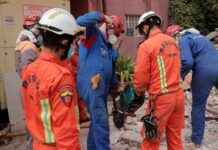Wildfires Devastate Carolinas, Triggering Evacuations and Destruction
As flames rage through the Carolinas, crews are tirelessly battling major wildfires that have ravaged hundreds of acres, forced evacuations, and left homes in ruins. The Table Rock fire, which first ignited on Friday, has ballooned to over 1,300 acres with no signs of containment, according to the South Carolina Forestry Commission’s update on Sunday night. Tractor crews and hand crews are diligently working to construct fire lines in a bid to rein in the inferno, as reported by Pickens County on its website. However, the remnants left behind by Hurricane Helene are proving to be a formidable obstacle, impeding access to certain areas.
The Challenge of Firefighters on the Frontlines
In South Carolina, another significant wildfire near Persimmon Ridge in Greenville County has been raging since Saturday, expanding to more than 800 acres without any containment, as confirmed by the commission. In response to the escalating crisis, South Carolina Governor Henry McMaster declared a state of emergency on Saturday, underscoring the severity of the situation. Despite the intense flames and widespread destruction, there have been no reports of injuries, offering a glimmer of hope amidst the chaos. The commission is set to deploy at least six aircraft on Monday for crucial water-dropping missions aimed at quelling the flames in both affected areas.
Rural North Carolina Battling its Own Infernos
Meanwhile, wildfires have also erupted in rural parts of Polk County, North Carolina, further exacerbating the crisis. The Black Cove and Deep Woods fires, each at zero percent containment, have collectively scorched over a thousand acres, as per a recent news release. Tragically, these fires have already claimed one home and two structures each, leaving a trail of devastation in their wake. On a slightly more positive note, the Fish Hook fire has achieved 50% containment, although it has sprawled to nearly 200 acres and resulted in the destruction of three homes. The overriding factors fueling these wildfires include strong winds, low humidity levels, and moderate to long-term drought conditions prevailing across the region, creating a perfect storm for disaster.
Impending Weather Woes in Other Areas
In addition to battling the wildfires, other parts of the country are bracing for severe weather conditions. Southeast Louisiana is currently under a severe thunderstorm watch, with the potential for strong thunderstorms looming throughout Monday along the I-10 corridor in northern Florida. Meanwhile, the Great Lakes to New England regions are slated to experience a wintry weather mix on Monday, with five million people under winter alerts for snow. Over the weekend, the Midwest, Ohio Valley, Southeast, and Gulf Coast regions faced significant and widespread severe weather, underscoring the urgent need for preparedness and vigilance in the face of nature’s fury.
In the midst of such calamity, the unwavering dedication of firefighters, emergency responders, and volunteers shines through, highlighting the resilience and unity of communities in times of crisis. As we stand in solidarity with those affected by the wildfires, let us lend our support however we can, whether through donations, volunteering, or simply spreading awareness. Together, we can overcome these challenges and emerge stronger on the other side, united in our shared humanity and collective spirit of resilience.
































